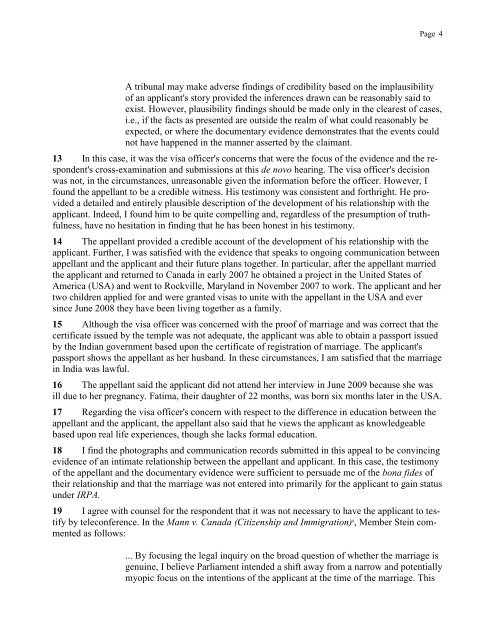Manekiya v. Canada (Minister of Citizenship and Immigration)
Manekiya v. Canada (Minister of Citizenship and Immigration)
Manekiya v. Canada (Minister of Citizenship and Immigration)
Create successful ePaper yourself
Turn your PDF publications into a flip-book with our unique Google optimized e-Paper software.
Page 4<br />
A tribunal may make adverse findings <strong>of</strong> credibility based on the implausibility<br />
<strong>of</strong> an applicant's story provided the inferences drawn can be reasonably said to<br />
exist. However, plausibility findings should be made only in the clearest <strong>of</strong> cases,<br />
i.e., if the facts as presented are outside the realm <strong>of</strong> what could reasonably be<br />
expected, or where the documentary evidence demonstrates that the events could<br />
not have happened in the manner asserted by the claimant.<br />
13 In this case, it was the visa <strong>of</strong>ficer's concerns that were the focus <strong>of</strong> the evidence <strong>and</strong> the respondent's<br />
cross-examination <strong>and</strong> submissions at this de novo hearing. The visa <strong>of</strong>ficer's decision<br />
was not, in the circumstances, unreasonable given the information before the <strong>of</strong>ficer. However, I<br />
found the appellant to be a credible witness. His testimony was consistent <strong>and</strong> forthright. He provided<br />
a detailed <strong>and</strong> entirely plausible description <strong>of</strong> the development <strong>of</strong> his relationship with the<br />
applicant. Indeed, I found him to be quite compelling <strong>and</strong>, regardless <strong>of</strong> the presumption <strong>of</strong> truthfulness,<br />
have no hesitation in finding that he has been honest in his testimony.<br />
14 The appellant provided a credible account <strong>of</strong> the development <strong>of</strong> his relationship with the<br />
applicant. Further, I was satisfied with the evidence that speaks to ongoing communication between<br />
appellant <strong>and</strong> the applicant <strong>and</strong> their future plans together. In particular, after the appellant married<br />
the applicant <strong>and</strong> returned to <strong>Canada</strong> in early 2007 he obtained a project in the United States <strong>of</strong><br />
America (USA) <strong>and</strong> went to Rockville, Maryl<strong>and</strong> in November 2007 to work. The applicant <strong>and</strong> her<br />
two children applied for <strong>and</strong> were granted visas to unite with the appellant in the USA <strong>and</strong> ever<br />
since June 2008 they have been living together as a family.<br />
15 Although the visa <strong>of</strong>ficer was concerned with the pro<strong>of</strong> <strong>of</strong> marriage <strong>and</strong> was correct that the<br />
certificate issued by the temple was not adequate, the applicant was able to obtain a passport issued<br />
by the Indian government based upon the certificate <strong>of</strong> registration <strong>of</strong> marriage. The applicant's<br />
passport shows the appellant as her husb<strong>and</strong>. In these circumstances, I am satisfied that the marriage<br />
in India was lawful.<br />
16 The appellant said the applicant did not attend her interview in June 2009 because she was<br />
ill due to her pregnancy. Fatima, their daughter <strong>of</strong> 22 months, was born six months later in the USA.<br />
17 Regarding the visa <strong>of</strong>ficer's concern with respect to the difference in education between the<br />
appellant <strong>and</strong> the applicant, the appellant also said that he views the applicant as knowledgeable<br />
based upon real life experiences, though she lacks formal education.<br />
18 I find the photographs <strong>and</strong> communication records submitted in this appeal to be convincing<br />
evidence <strong>of</strong> an intimate relationship between the appellant <strong>and</strong> applicant. In this case, the testimony<br />
<strong>of</strong> the appellant <strong>and</strong> the documentary evidence were sufficient to persuade me <strong>of</strong> the bona fides <strong>of</strong><br />
their relationship <strong>and</strong> that the marriage was not entered into primarily for the applicant to gain status<br />
under IRPA.<br />
19 I agree with counsel for the respondent that it was not necessary to have the applicant to testify<br />
by teleconference. In the Mann v. <strong>Canada</strong> (<strong>Citizenship</strong> <strong>and</strong> <strong>Immigration</strong>) 8 , Member Stein commented<br />
as follows:<br />
... By focusing the legal inquiry on the broad question <strong>of</strong> whether the marriage is<br />
genuine, I believe Parliament intended a shift away from a narrow <strong>and</strong> potentially<br />
myopic focus on the intentions <strong>of</strong> the applicant at the time <strong>of</strong> the marriage. This


